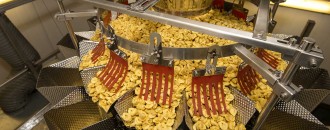
Lack of infrastructure, skilled manpower impacting F&B industry: Report
The Dollar Business Bureau  A complete lack of quality infrastructure and shortage of adequate skilled manpower are some key issues hampering the growth of the Food & Beverage service industry in India, as per a recent FICCI-Grant Thornton report released in the capital on Tuesday. Titled ‘Unlocking the potential in the food and beverage services sector’, the report highlights how government intervention in creating good infrastructure and developing skilled manpower can help in boosting the growth of the sector. It also proposes that real estate costs can possibly be reduced by lobbying with developers to create a better formula of rent sharing and developing innovative models for rent. Simplified licensing requirements with a single-window clearance approach and rationalisation of taxes levied on the restaurant industry are a few solutions proposed in the report to effectively tackle licensing and taxation issues as faced by the industry. Atul Chaturvedi, Joint Secretary, Department of Industrial Policy & Promotion (DIPP) said that the government recognizes the F&B sector’s potential for growth and job creation. Hence it has been identified as a priority sector in the National Manufacturing Policy and is also among the top 25 priority sectors that are being promoted across the globe to attract investments. Speaking about the way forward, he said that the government is now looking at identifying potential markets and then engaging with potential investors to convert prospective investments into real ventures. “The government has been of late, focused on developing the food processing infrastructure through the promotion of cold chains and integrated food parks by subsidising the capital cost. This will not only ensure the right infrastructure availability to setup processing units to provide quality inputs to the restaurant sector, but also provide a big boost to the availability of processed foods within the country, which were in a number of cases, imported. These initiatives will go a long way in promoting the ‘Make in India’ initiative,” Vinamra Shastri, Partner, Grant Thornton India LLP said. The report revealed that food expenditure constitutes the majority of India’s consumption basket and with an increasing young population, eating out is only expected to be more frequent. Eating out has evolved from an occasion driven activity to an occasion in itself for the youth. According to the report, the maximum growth being witnessed is still in the standalone restaurant space where local taste along with uniqueness of concept is the key deciding factor. Also, among the various segments within the restaurant sector, Quick Service Restaurants and Casual Dining Restaurants constitute the largest categories – combined they constitute more than 77% of the overall market. Café segment has emerged as the third category with the market size pegged at around Rs 25,000 crore and growing at 10% per year-on-year. Though the fine dining market constitutes only 3% of the market, the segment is witnessing a renewed interest and a large number of multinational chains are entering the market.
A complete lack of quality infrastructure and shortage of adequate skilled manpower are some key issues hampering the growth of the Food & Beverage service industry in India, as per a recent FICCI-Grant Thornton report released in the capital on Tuesday. Titled ‘Unlocking the potential in the food and beverage services sector’, the report highlights how government intervention in creating good infrastructure and developing skilled manpower can help in boosting the growth of the sector. It also proposes that real estate costs can possibly be reduced by lobbying with developers to create a better formula of rent sharing and developing innovative models for rent. Simplified licensing requirements with a single-window clearance approach and rationalisation of taxes levied on the restaurant industry are a few solutions proposed in the report to effectively tackle licensing and taxation issues as faced by the industry. Atul Chaturvedi, Joint Secretary, Department of Industrial Policy & Promotion (DIPP) said that the government recognizes the F&B sector’s potential for growth and job creation. Hence it has been identified as a priority sector in the National Manufacturing Policy and is also among the top 25 priority sectors that are being promoted across the globe to attract investments. Speaking about the way forward, he said that the government is now looking at identifying potential markets and then engaging with potential investors to convert prospective investments into real ventures. “The government has been of late, focused on developing the food processing infrastructure through the promotion of cold chains and integrated food parks by subsidising the capital cost. This will not only ensure the right infrastructure availability to setup processing units to provide quality inputs to the restaurant sector, but also provide a big boost to the availability of processed foods within the country, which were in a number of cases, imported. These initiatives will go a long way in promoting the ‘Make in India’ initiative,” Vinamra Shastri, Partner, Grant Thornton India LLP said. The report revealed that food expenditure constitutes the majority of India’s consumption basket and with an increasing young population, eating out is only expected to be more frequent. Eating out has evolved from an occasion driven activity to an occasion in itself for the youth. According to the report, the maximum growth being witnessed is still in the standalone restaurant space where local taste along with uniqueness of concept is the key deciding factor. Also, among the various segments within the restaurant sector, Quick Service Restaurants and Casual Dining Restaurants constitute the largest categories – combined they constitute more than 77% of the overall market. Café segment has emerged as the third category with the market size pegged at around Rs 25,000 crore and growing at 10% per year-on-year. Though the fine dining market constitutes only 3% of the market, the segment is witnessing a renewed interest and a large number of multinational chains are entering the market.
May 27, 2015 | 9:24 pm IST.






 to success.
to success.